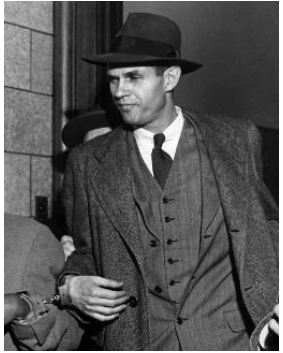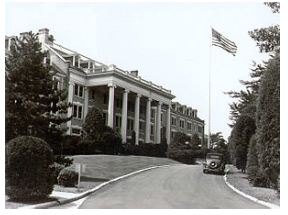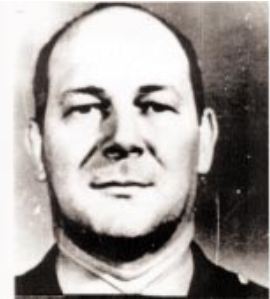
(State Department Official and Soviet Spy Alger Hiss in handcuffs. He dined out on his innocence for decades after. Photo AP.)
I was sitting with Mac last night at Willow. We are trying to get him out when he
feels up to it, and he is, of course, a rock star to the Regulars at the Amen
Corner.
I did not take notes. My leg is bothering me still, and we talked about the future
rather than the past- plans for the 70th anniversary of the Battle of Midway, and
whether or not we should wear tux for the Ball (Mac will not).
We managed to get Liz-with-an-S in trouble with management along the way- I won’t go into the intricacies of the restaurant business, except to say that we should have balanced our relations with Labor and Management less effectively. It is a delicate balance, and the value of labor always has to be balanced against the essential energy of those sweat has made the work possible in the beginning.
It doesn’t always balance that well, and it is important to keep the lines of
communication open. So, in the interest of that, I am going to keep my mouth shut about whether or not certain industry events get a little confused on the concept of whether an “open bar” means a “no tip” bar for people who are making $2.13 an hour.
“I made more than that on the loading dock in 1966,” I said.
The waitress was in mufti- on the civilian side of the bar for a change- and she
shrugged. “We work for tips. The rest of it just goes to cover the social security
and Medicare.”
It is enough to make you feel like a fellow-traveler in solidarity with the workers
of the world, you know?
We wound up with a great crowd at the bar- Senior Executive Jeff and John-with and Jon-without, and Old Jim and the other usual suspects. Mac had exactly two Anchor Steam beers, and I had about enough happy Hour White to navigate on my cane to the Bluesmobile parked at the curb down the block.
Of course, talking about the present lead right back around the rosebush to the
past. We talked about Mac’s return to Hawaii as we discussed arrangements for
lodging in the future, commingling the atmosphere of the pleasant islands against
the backdrop of wars against the Empire of Japan and the later one against the VC and North Vietnamese Regulars.
Mac had been the Pacific Fleet Intelligence Officer (N2) in the mid-sixties during
the big uild-up in South East Asia, and he described (a little wistfully) how he and
his wife Billie would get a room at one of the grand hotels to stay over night while
attending social events over in Honolulu or Kahala. “We used to do the same thing,” I said. “It made you feel a little like a well-heeled tourist rather than a staff
puke at the Headquarters.”
Somehow the Health Care arguments before the Supreme Court came up in passing, since it affects all of us, not just those of a certain age, and Mac vowed that he was going to make the century mark. That lead in a round about matter to a discussion of the role of the Judicial Branch in the ‘separation of powers’ scheme of our topsy-turvy government.
Say what you like about the Court- mostly invisible, the SCOTUS has a direct and
sometimes startling impact on the rest of our sprawling government. Remember Bush V. Gore? And they may be at it again with the Affordable (or not) Health Care Act’s constitutionality.
“The Government could not come up with a defining reason for why it could not force
us to buy Broccoli,” said John-with. “It is about liberty.”
“I am uncomfortable with the whole green vegetable mandate,” I said. “But all
President’s have had problems with the Supremes. Remember FDR and packing the Court?”
Old Jim pursed his lips. “The Judicial Procedures Reform Bill of 1937 would have
added more associate justices to the High Court. That was FDR’s scheme to pack the court with New Deal sympathizers to approve legislation that had been declared
unconstitutional by the mostly Republican-appointed court.”
“Yeah,” I said. “Court-packing. The constitution doesn’t specify the number of
judges, and FDR wanted the authority to an additional Justice, up to a maximum of six, for every sitting member over the age of 70 years and 6 months.”
“That is not so old,” said Old Jim, taking a swig of Budweiser.
“All things in perspective,” said Mac. “That is positively youthful.”
“There was quite a sea change in Washington in those days. I wrote a series of
stories about the neighborhood around Big Pink. The Buckingham housing development and the others along Route 50 were created to house all the New Dealers who were coming to town to fix the Depression.”
“That is not the only bunch who came to town. So did the spies.”
Mac came back to DC from Hawaii in 1946, and transferred to the Restricted Line- Special Duty Intelligence. He married Billie here, and served for a year in the
Pentagon and at Foggy Bottom as an editor on the Diplomatic Cable, a summary product of the War Department, Navy and State. Then he got a transfer to London and Naples, and had some excellent adventures in the opening days of the Cold War in Europe.
“The Diplomatic Cable was composed from the intercepted communications of the embassies, right? Did it include the VENONA information?”
Mac shook his head. “No, that stuff was too sensitive. Army Chief of Staff Omar
Bradley kept the lid on that stuff pretty tight.”
“What was Venona?” asked Jon-without, adjusting his bow tie. We had also been
talking about how he kept the black caps on his well-crafted shoes with such an
authoritative gleam- his description of the old t-shirt rags and black polish
reminded me of Aviation Officer Candidate School, and my vow never to have a highly polished gleam on any shoes I owned since.

(The Headquarters Building at Arlington Hall. It is still there, though they don’t do codes there any more. Photo US Army.)
“VENONA was a break in Soviet diplomatic cables,” said Mac. “The Army did the work
at Arlington Hall, across from where Vic lives. I do not have time to delve too
deeply into the Sources and Methods aspect of VENONA. That was just the last
codeword for a dozen exploit programs that took advantage of a flaw in the Soviet
communications system. They re-used some of the cyphers contained in one-time pads
due to the exigencies of an expanding war in the East. Only the years between
1942-44 yielded much data, though the files were worked all the way up to 1980
before cryptologic resources were moved on to more pressing issues.”
“Those were the ones that had the names of all the Soviet Agents in the US
Government,” I said. “It was political dynamite. That is how they got tipped to the
Rosenberg atom spy ring at Los Alamos.”
Mac nodded. “What we did on the Diplomatic Cable did not include that material. Our
produce was the lineal antecedent of what you guys call the National Intelligence
Daily.” He paused in thought. “The VENONA matter was an uncomfortable one for
everyone. The true names of the Soviet agents were not in the cables, only code
words, so there was a little ambiguity. They were afraid it would all be
inadmissible in court, so they sat on it.”

(Bill Weisband in uniform. He was a great guy, well-liked by his Arlington Hall co-workers. Photo US Army).
“Yeah,” I said, taking a sip of Happy Hour White. “The Soviets were tipped to the
matter fairly early on- the bulk of the successfully decrypted messages were
harvested only up to 1945. An Army officer named Bill Weisband, a native of Odessa,
was the mole who probably disclosed the success of the operation to his handlers in Moscow.”
“Asshole,” said John-with.
“Yeah, he never faced the music for what he did. Died of a massive heart attack on
the George Washington Parkway. Sold insurance after they eased him out of Arlington hall. He never stood trial.”
“Most of them didn’t. It was too explosive,” said Mac. “Weisband was born in Odessa, and his Russian was flawless. He had access to all areas of Arlington Hall’s Soviet work, including the Western atomic scientists who cooperated with the Soviets at least as early as 1944.”
“And Alger Hiss,” I said. “That asshole.”
“That was quite the controversy in the day- him and Whittaker Chambers and the
Pumpkin Papers.”
“Hiss had his defenders all the rest of his life. The trial of the century is what
they called it when they tried him for perjury.”
Mac nodded. “It was not until the KGB files opened up briefly in the early 1990s.
That is what nailed him as a Soviet Agent almost conclusively.”
“The ambiguity of his guilt became a litmus test of political views, since the very
basis of evidence was likewise ambiguous. Senior army officers, in consultation with
the FBI and CIA, made the decision to restrict knowledge of VENONA within the
government. Army Chief of Staff Omar Bradley was concerned about the White House’s history of leaking sensitive information.”
“Yeah,” I said. “Harry Hopkins was fingered as a mole, and he was at FDR’s shoulder the whole war.”
“To some degree, Bradley’s decision to keep the VENONA material secret was
counter-productive; Truman was distrustful enough of J. Edgar Hoover, and suspected the reports of Soviet penetration were exaggerated to obtain political leverage for the Bureau.”
“Enter Tail Gunner Joe, and Dick Nixon and Ray Cohn the great Communist witch-hunt.”
“It is only a witch hunt if there aren’t witches,” I said. “There really wasn’t any
organization in town here that wasn’t penetrated. It was amazing.”
“Still controversial in some quarters,” said Old Jim. “I met Bill Kunstler one time,
the hired legal gun of the ’60s radicals. One of his last great quotes was after the
Moynihan Commission on government secrecy reported out with all the VENONA
revelations. Kunstler claimed the Army had forged the whole project to discredit
honest Americans.”
“He was another asshole,” I said. “I remember him well.”
John-with snorted. “That was back when things were harder and they had to steal
secrets the hard way, by human agent.”
“Yeah, you are right,” I declared, draining my glass of wine and covering the top
with my palm when Liz-S attempted to fill it up again. “Now the Chinese just hack it all without having to leave a computer terminal in Guangdong Province.”
“Sort of makes you homesick for the old days,” said Jon-without.
Mac shook his head. “Not so much,” he said. “Just think of Alger Hiss in handcuffs.”
Copyright 2012 Vic Socotra
www.vicsocotra.com
